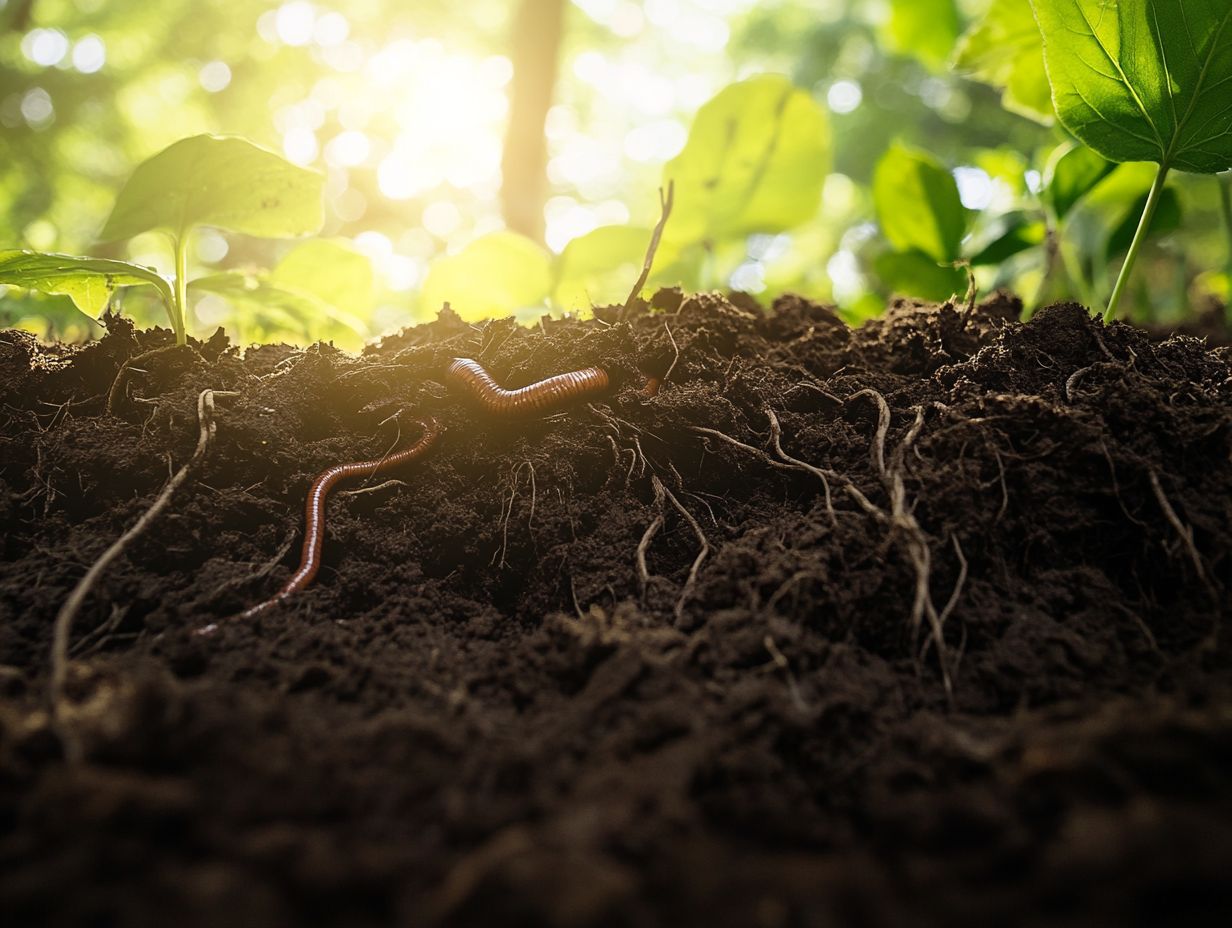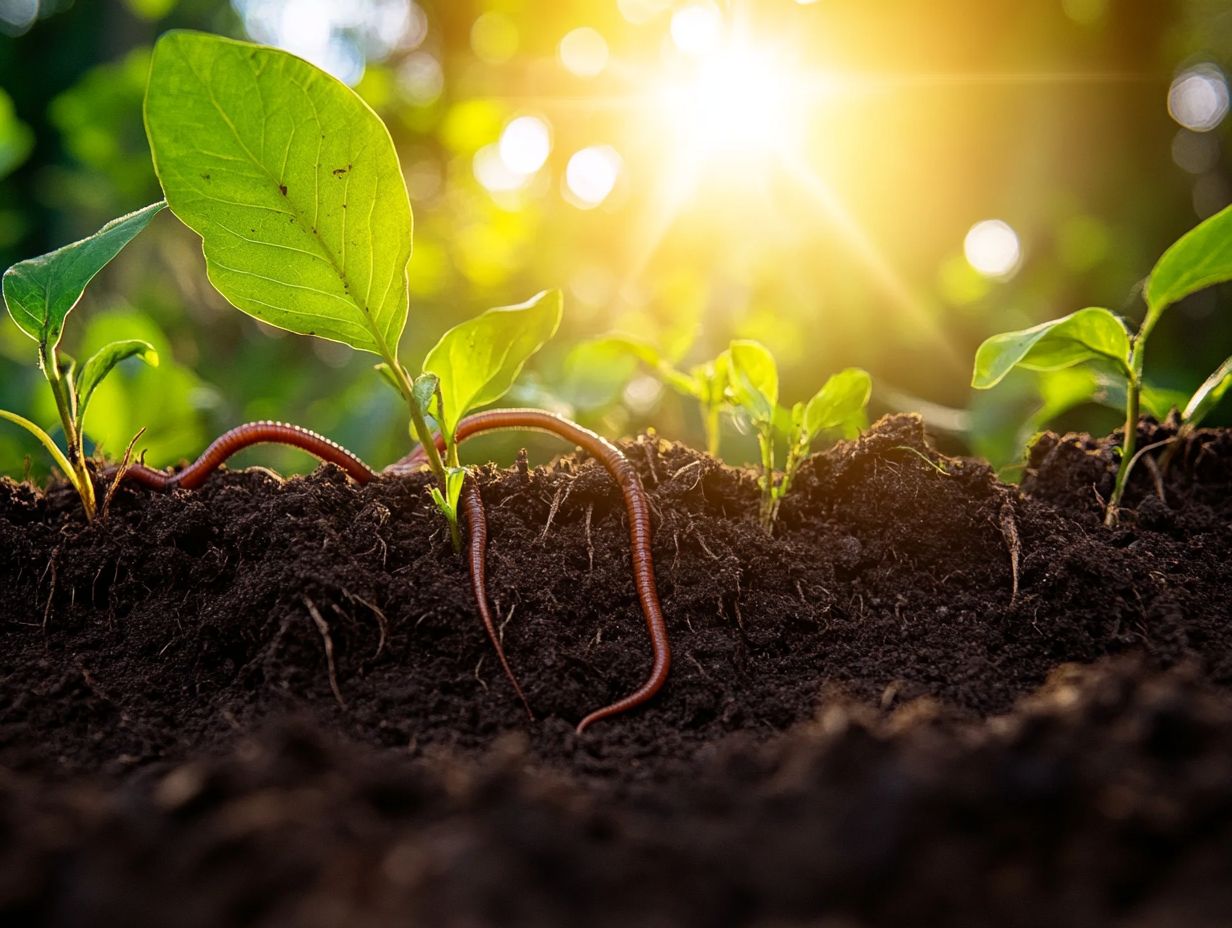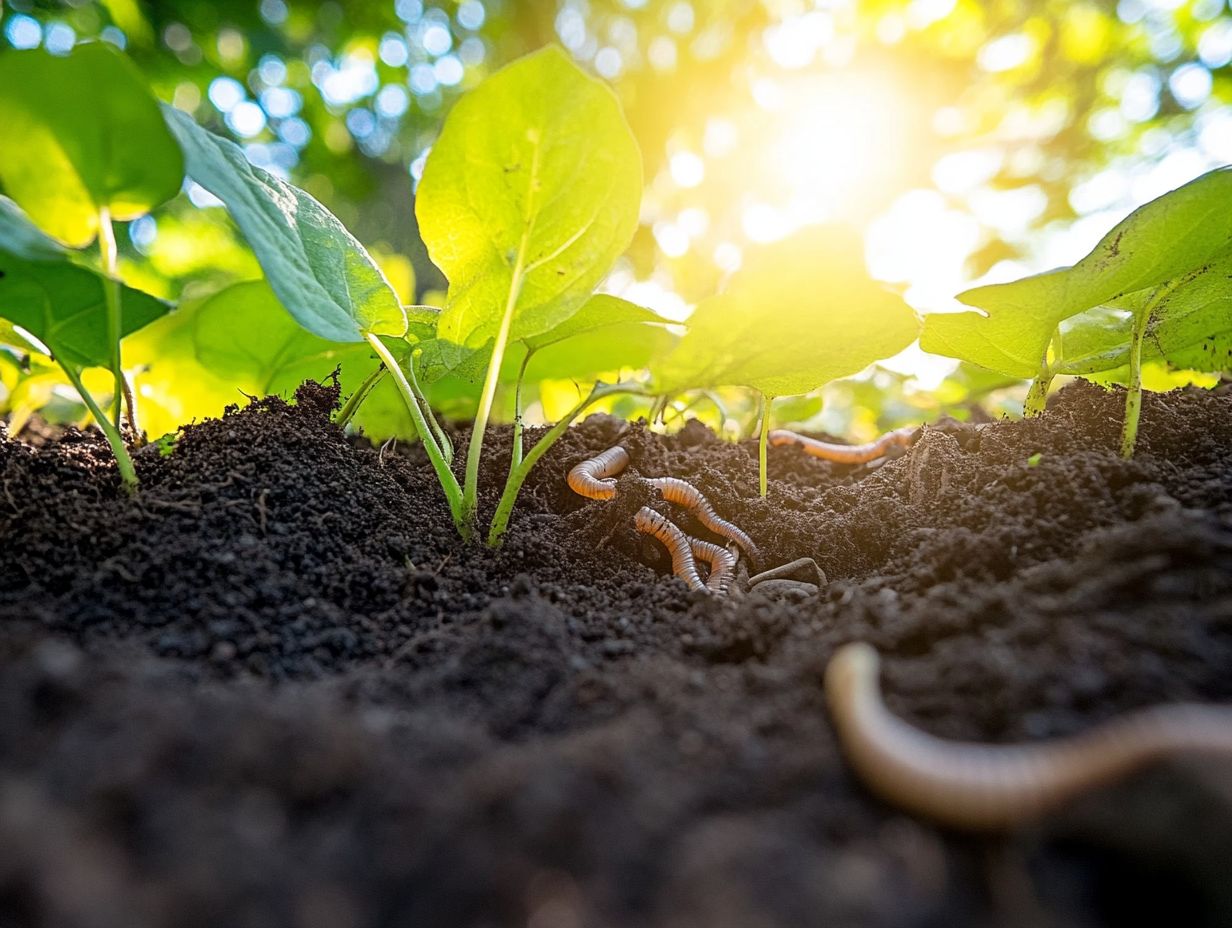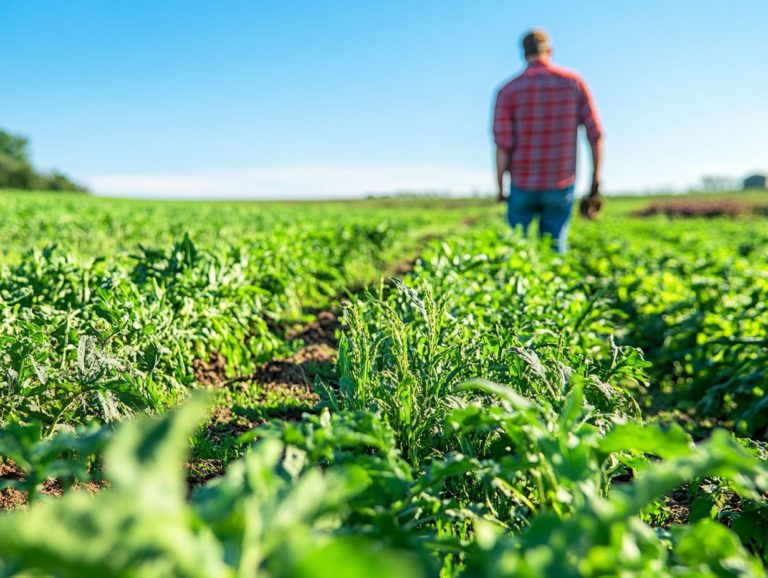The Role of Organic Matter in Soil Health
Soil health is the cornerstone of a thriving ecosystem. It impacts everything from plant growth to water quality.
Understanding the significance of organic matter is essential for nurturing this vital resource.
This article delves into the nature of organic matter. It highlights its critical role in enhancing soil quality and the numerous benefits it offers, including improved structure and fertility.
You will also find practical methods to increase organic matter in your soil. This paves the way for a healthier environment for generations to come.
Contents
Key Takeaways:

The Importance of Soil Health
Soil health stands as a cornerstone of sustainable agriculture. It influences everything from crop yields to the balance of ecosystems.
Healthy soil has the capacity to operate as a vibrant living system. It nurtures both plant and animal life and plays a vital role in nutrient cycling and organic matter decomposition.
Rich in organic material, healthy soil boasts improved structure.
It facilitates water infiltration and fosters biological activity among its diverse organisms. By adopting effective agricultural practices that prioritize soil health, you can elevate soil quality and enhance nutrient availability.
This secures the long-term sustainability of your agricultural endeavors.
Why Soil Health Matters
Soil health is paramount because it directly influences agricultural productivity, food security, and environmental sustainability.
When you focus on maintaining healthy soil, you ensure that crops receive the essential nutrients necessary for robust growth and optimal yield.
Rich organic matter in the soil provides vital minerals and nutrients. It also enhances soil structure, promoting better water retention and drainage.
On the flip side, soil erosion can strip away those crucial nutrients. This leads to diminished crop resilience and reduced productivity.
This degradation might push farmers to resort to chemical fertilizers, further disrupting the delicate balance of soil ecosystems.
Understanding soil health is crucial! It s your key to unlocking sustainable farming and ensuring food stability for the future.
What is Organic Matter?
Organic matter represents the decomposition of plant and animal materials that enrich your soil. It plays a crucial role in maintaining soil health and fertility.
Recognizing its importance allows you to enhance the vitality of your garden or landscape. This ensures a thriving ecosystem beneath the surface.
Defining Organic Matter and its Sources

Organic matter is a fascinating blend of decomposed plant and animal materials, commonly known as soil organic matter. It acts as a vital reservoir of nutrients for soil ecosystems.
This rich component may stem from various sources, including fallen leaves, crop residues, and even charcoal. These all enrich the soil environment, making it more vibrant and healthy.
As these organic residues decompose through microbial action and natural processes, they transform into humus and enhance soil structure.
This boosts soil’s capacity to retain water and nutrients. This decomposition process is crucial; it replenishes the nutrient supply and encourages greater microbial diversity.
Such a dynamic system is essential for sustaining plant growth and fostering ecological balance.
The Role of Organic Matter in Soil Health
Organic matter serves as a cornerstone for enhancing soil health. It enriches soil properties and facilitates the vital processes of nutrient cycling.
It significantly boosts the ability of soil to hold onto nutrients, ensuring that essential nutrients are readily available for plant uptake.
How Organic Matter Affects Soil Quality
The presence of organic matter greatly enhances soil quality, improving its structure, moisture retention, and nutrient availability key components for fostering healthy plant growth.
This enrichment elevates the soil’s overall fertility and resilience, creating an ideal environment for roots to expand and flourish.
Consider organic inputs such as compost, manure, and cover crops; they introduce essential nutrients while stimulating the growth of beneficial microorganisms. These tiny allies play a vital role in nutrient cycling, breaking down organic materials into forms that plants can readily absorb.
Think of organic matter as a sponge. It boosts the soil’s ability to retain moisture during dry spells and reduces the need for frequent irrigation. These sustainable practices not only nurture ecological balance but also enhance plant health and agricultural productivity.
Benefits of Organic Matter in Soil
Organic matter offers many advantages for soil health. By enhancing soil structure, fertility, moisture retention, and nutrient availability, it significantly boosts crop production.
Embracing organic matter in your soil management practices can lead to thriving, productive landscapes.
Improving Soil Structure and Fertility

Organic matter is crucial for enhancing soil structure, which subsequently boosts soil fertility through the promotion of soil aggregate formation and the support of microbial activity.
When you incorporate organic materials, like decomposed plant and animal matter, into your soil, they play a significant role in binding soil particles together. This process creates a network of larger clumps that improves aeration and water retention both vital for robust root development.
These soil aggregates also offer small homes for beneficial microorganisms, nurturing a dynamic soil ecosystem. The presence of these microbes not only facilitates nutrient cycling but also aids in suppressing disease-causing organisms in the soil, ultimately leading to healthier soil and increased crop yields.
Increasing Water Retention and Nutrient Availability
Increasing organic matter in your soil significantly enhances water retention and nutrient availability two critical factors for fostering soil health and maximizing agricultural productivity.
This enhancement cultivates a more resilient ecosystem, allowing your crops to thrive even during droughts while efficiently utilizing nutrients. You can adopt practices such as cover cropping, compost application, and reduced tillage to enrich your soil with organic matter.
For instance, incorporating cover crops like clover or rye not only fixes nitrogen but also improves soil structure, while compost serves as a rich source of nutrients and beneficial microorganisms.
These methods are crucial and exciting for sustainable agriculture! By implementing them, you ensure that your land remains productive for future generations while minimizing environmental impact.
Ways to Increase Organic Matter in Soil
To elevate soil health, you can employ a range of sophisticated strategies aimed at boosting organic matter. Consider utilizing soil amendments, integrating cover crops into your farming practices, and implementing crop rotation techniques.
Each of these methods contributes significantly to nurturing and enriching the soil, creating a vibrant ecosystem that supports robust plant growth.
Practical Methods for Boosting Soil Health
Practical methods for enhancing soil health include applying organic inputs, utilizing soil amendments, and incorporating cover crops within conservation agriculture frameworks.
These techniques not only enrich soil bioactivity but also promote better nutrient retention, ultimately leading to improved crop productivity. For instance, incorporating organic inputs like compost invigorates microbial life, which plays a crucial role in breaking down complex organic materials into usable nutrients.
Soil amendments, such as lime (which helps balance acidity) and gypsum, are essential for adjusting pH levels and enhancing soil structure. This facilitates root penetration and improves water retention.
By integrating cover crops, you can effectively reduce erosion, suppress weeds, and naturally improve soil fertility through nitrogen fixation (the process by which some plants convert nitrogen from the atmosphere into a form usable by plants).
All these elements work together within conservation agriculture, ensuring the soil remains healthy and productive for generations to come.
Frequently Asked Questions

What is the role of organic matter in soil health?
The role of organic matter in soil health is crucial as it improves soil structure, increases nutrient availability, and promotes beneficial microbial activity.
How does organic matter improve soil structure?
Organic matter enhances soil structure by binding soil particles together. This creates pore spaces for air and water to flow, which helps prevent soil compaction.
Why is nutrient availability important for soil health and crop production?
Nutrient availability is vital for soil health because plants need essential nutrients to grow and thrive. Organic matter releases these nutrients slowly, ensuring long-term plant health.
How does organic matter promote beneficial microbial activity and nutrient cycling?
Organic matter serves as a food source for soil microorganisms, which are vital in nutrient cycling, decomposing organic matter, and suppressing diseases.
What are some sources of organic matter for soil health and ecosystems?
Common sources of organic matter include compost, manure, cover crops, and plant residues. These materials can be added to the soil as amendments or through natural decomposition processes.
Can too much organic matter be harmful to soil health and quality?
Yes, excessive organic matter can harm soil health if not managed properly. It can lead to imbalanced nutrient levels, waterlogging, and an increased risk of diseases and pests.






